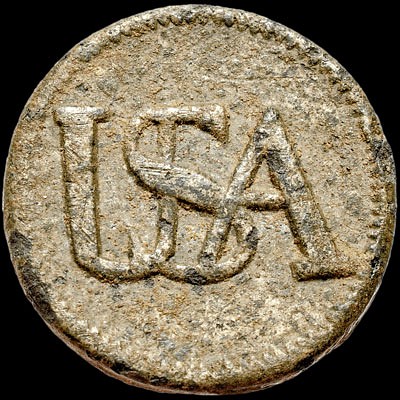1770 Gentlemans Magazine w/BOSTON MASSACRE + AMERICAN RESPONSE to BRITISH TAXES
Lot 41
Estimate:
$600 - $800
Absentee vs Live bid
Two ways to bid:
- Leave a max absentee bid and the platform will bid on your behalf up to your maximum bid during the live auction.
- Bid live during the auction and your bids will be submitted real-time to the auctioneer.
Bid Increments
| Price | Bid Increment |
|---|---|
| $0 | $10 |
| $200 | $20 |
| $300 | $25 |
| $500 | $50 |
| $1,000 | $100 |
| $2,000 | $200 |
| $3,000 | $250 |
| $5,000 | $500 |
| $10,000 | $1,000 |
| $20,000 | $2,000 |
| $30,000 | $2,500 |
| $50,000 | $5,000 |
| $100,000 | $10,000 |
| $200,000 | $20,000 |
| $300,000 | $25,000 |
| $500,000 | $50,000 |
About Auction
By Early American History Auctions
Aug 21, 2021
Set Reminder
2021-08-21 12:00:00
2021-08-21 12:00:00
America/New_York
Bidsquare
Bidsquare : Autographs - Historic & Political Americana - Militaria & Guns
https://www.bidsquare.com/auctions/early-american-history-auctions/autographs---historic-political-americana---militaria-guns-7321
335 Lots of Rare, Historic Autographs, Americana, Civil War Era, George Washington, Revolutionary War Era, Colonial America, Federal Period, War of 1812, Colonial Currency & more... Early American History Auctions auctions@earlyamerican.com
335 Lots of Rare, Historic Autographs, Americana, Civil War Era, George Washington, Revolutionary War Era, Colonial America, Federal Period, War of 1812, Colonial Currency & more... Early American History Auctions auctions@earlyamerican.com
- Lot Description
Colonial America
June 1770 Issue of The Gentleman's Magazine with Reports on "The Boston Massacre" and American Response to Taxes
June, 1770-Dated (Written May 1770) Colonial Era, monthly news Magazine titled, "The Gentleman's Magazine," with historical reports on the BOSTON MASSACRE, Anti-British North American Colonies Taxation, and the American Response with the tightening of the Non-Importation Agreements by the Colonies, London, England, Choice Extremely Fine.
June, 1770-Dated (Written May 1770) Colonial Era monthly news magazine titled, "The Gentleman's Magazine" (London, England) dated . This original news magazine contains a prominent inside page headline: "AMERICAN AFFAIRS" with a full page of period contemporary American news, briefly reporting of the aftermath of the "BOSTON MASSACRE" specifically mentioning the date of March 5th, 1770, and the tightening of the Non-Importation Agreements by the North American Colonies as a response to this Massacre. This reporting also of a general reaction being against the right of the British Parliament to Tax their subjects in the North American Colonies. The condition is quite choice, disbound, 40 pages, Complete with Cover, with a special inside cover page intro page titled "AMERICAN AFFAIRS" apparently to add the most recent news and events. Overall, crisp and clean with its illustration page intact.
The Boston Massacre was a confrontation on March 5, 1770, in which British soldiers shot and killed several people while being harassed by a mob in Boston. The event was heavily publicized by leading Patriots such as Paul Revere and Samuel Adams. British troops had been stationed in the Province of Massachusetts Bay since 1768 in order to support crown-appointed officials and to enforce unpopular Parliamentary legislation.
Amid tense relations between the civilians and the soldiers, a mob formed around a British sentry and verbally abused him. He was eventually supported by seven additional soldiers, led by Captain Thomas Preston, who were hit by clubs, stones, and snowballs. Eventually, one soldier fired, prompting the others to fire without an order by Preston. The gunfire instantly killed three people and wounded eight others, two of whom later died of their wounds.
The crowd eventually dispersed after Acting Governor Thomas Hutchinson promised an inquiry, but they re-formed the next day, prompting the withdrawal of the troops to Castle Island. Eight soldiers, one officer, and four civilians were arrested and charged with murder, and they were defended by future U.S. President John Adams. Six of the soldiers were acquitted; the other two were convicted of manslaughter and given reduced sentences. The two found guilty of manslaughter were sentenced to branding on their hand.
The Boston Non-importation agreement was a boycott which restricted importation of goods to the city of Boston. This agreement was signed on August 1, 1768, by more than sixty merchants and traders. After two weeks time, there were only sixteen traders who did not join the effort.
In the upcoming months and years, this non-importation initiative was adopted by other cities, New York had joined the very same year, Philadelphia followed a year later. Boston had, however, stayed the leader in forming an opposition to the mother country and its taxing policy.
This boycott lasted until the year of 1770 when the British Parliament was forced to repeal the acts against which the Boston Non-importation agreement was meant.
All the struggle over the 1760s can be seen as a tough commitment of the Colonials for economic and political independence, an attempt to remove, what they considered, illegal taxes and duties. One of such attempts was the Boston Non-importation agreement which, even though, not an enormous success, also contributed to this struggle which would later result in more escalated conflicts and later in the American Revolution itself. One can also conclude that non-importations were also a means to clean the inventories, reset the economics and balance the exchange rates.
- Shipping Info
-
Early American provides in-house worldwide shipping. Please contact us directly if you have questions about your specific shipping requirements.
-
- Buyer's Premium



 EUR
EUR CAD
CAD AUD
AUD GBP
GBP MXN
MXN HKD
HKD CNY
CNY MYR
MYR SEK
SEK SGD
SGD CHF
CHF THB
THB















